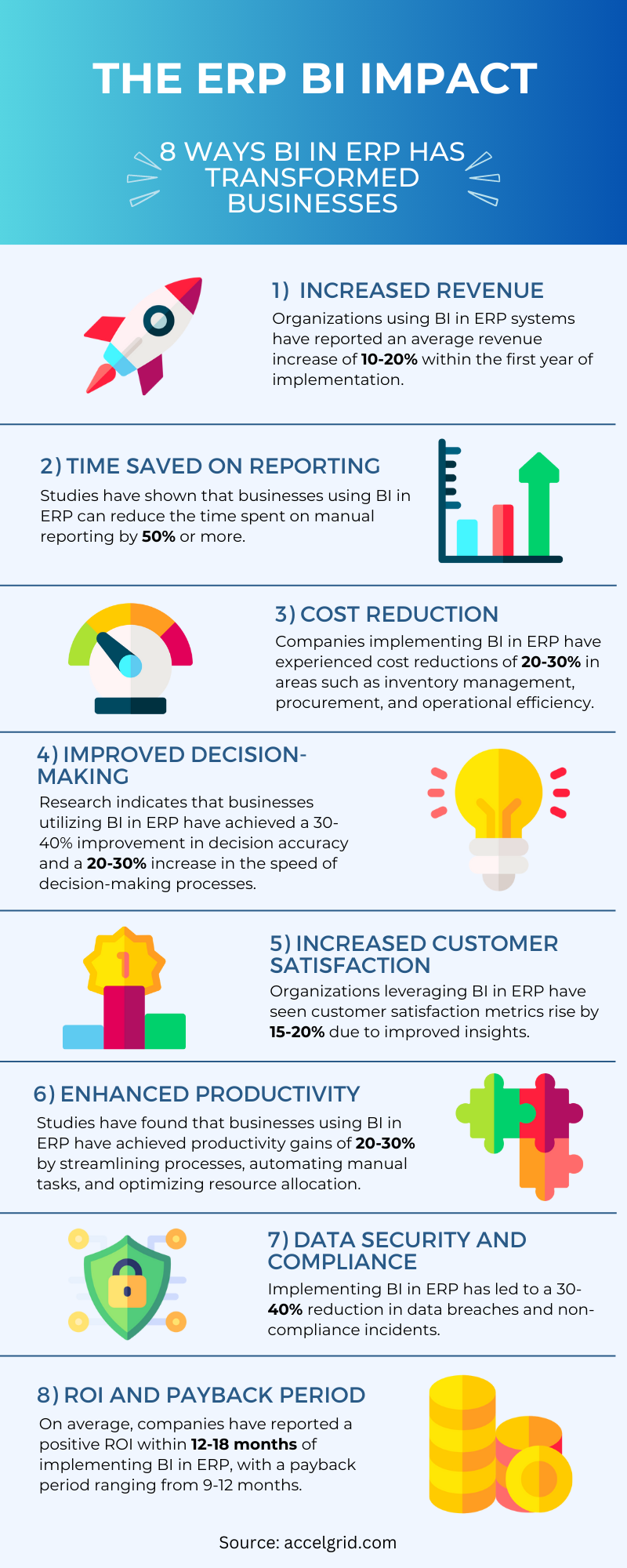Business Intelligence in ERP: Unleashing Insights for Informed Decision-making
Join us as we unlock the secrets behind business intelligence in ERP and how businesses can leverage data to uncover hidden opportunities and drive growth.


Discover the benefits of AccelGrid

Convert more leads into revenue

Manage orders at scale

Streamline billing and get paid on time

Rock-solid inventory control

Optimize your supply chain

Switch to lean manufacturing

Sell anywhere, anytime with mobile POS

Simplify accounting and grow your business

Sell more with integrated eCommerce

AI-powered demand forecasting
Convert more leads into revenue
Manage orders at scale
Rock-solid inventory control
Streamline billing and get paid on time
Optimize your supply chain
Achieve lean manufacturing
Sell more with integrated eCommerce
Sell anywhere, anytime with mobile POS
AI-powered demand forecasting
Simplify accounting and grow your business
In today’s fast-paced business landscape, staying ahead of competitors requires more than just intuition – it demands harnessing the transformative potential of BI within your ERP system. Join us as we unlock the secrets behind this dynamic duo, exploring how businesses can leverage their data to uncover hidden opportunities, optimize operations, and propel themselves toward unprecedented success. Get ready to be amazed by the untapped potential that awaits as we unleash the true power of Business Intelligence in ERP!
The term “business intelligence” (BI) has become increasingly popular in recent years, as organizations strive to gain a competitive edge by making better use of the data at their disposal. BI tools and techniques can help organizations to make more informed decisions, by providing insights that would otherwise be hidden in mountains of raw data.
Most ERP systems now offer some form of BI functionality, although the depth and breadth of this varies considerably from one vendor to another. In this article, we will provide an overview of BI in ERP, looking at what it is, how it can be used, and some of the key vendors in this space.
So what exactly is business intelligence? Broadly speaking, it is any process or technique that helps to convert raw data into useful information that can be used for decision-making purposes. This information can take many different forms, such as reports, dashboards, charts, and so on.
Business intelligence (BI) is a critical component of ERP systems. It provides the data and insights necessary to make informed decisions about your business. Here are some of the key benefits of using BI in ERP:
In today’s rapidly evolving business landscape, making informed decisions is paramount for achieving success and maintaining a competitive edge. Fortunately, businesses now have a powerful tool at their disposal: Business Intelligence integrated into ERP systems. The marriage of these two technologies has revolutionized decision-making processes by providing comprehensive and real-time insights into various facets of an organization’s operations. With BI in ERP, decision-makers can access and analyze vast amounts of data from multiple sources, transforming raw information into meaningful and actionable insights. This enables them to make more accurate, strategic, and timely decisions that drive growth, optimize resources, and enhance overall performance. From forecasting demand and identifying trends to monitoring key performance indicators and evaluating risk, BI in ERP empowers businesses to make data-driven decisions that fuel success in today’s dynamic business environment.
Efficiency is a critical factor in the success of any organization. Streamlining processes, eliminating bottlenecks, and optimizing resources are key objectives for businesses striving to achieve maximum productivity. This is where Business Intelligence integrated into Enterprise Resource Planning systems plays a transformative role. By leveraging BI in ERP, companies can access real-time data and gain valuable insights into their operations. This enables them to identify inefficiencies, pinpoint areas for improvement, and implement data-driven strategies to increase overall efficiency. With BI in ERP, organizations can automate manual tasks, improve workflow management, and enhance collaboration across different departments. Moreover, the ability to generate customized reports and dashboards empowers decision-makers to monitor performance metrics and identify areas of potential improvement. By harnessing the power of BI in ERP, businesses can unlock new levels of efficiency, optimize operations, and achieve sustainable growth in today’s competitive landscape.
When it comes to delivering exceptional customer service, BI integrated into ERP systems can be a game-changer. By harnessing the power of BI in ERP, businesses can gain valuable insights into customer behavior, preferences, and needs. This comprehensive understanding allows organizations to personalize their interactions, anticipate customer demands, and proactively address issues. With BI in ERP, businesses can analyze historical and real-time data, such as purchase history, customer feedback, and support tickets, to identify patterns and trends. Armed with this information, customer service teams can offer timely and relevant solutions, resulting in higher customer satisfaction and loyalty. Moreover, BI in ERP enables businesses to track and measure key performance indicators, such as response times and customer satisfaction scores, ensuring continuous improvement in customer service delivery. By leveraging the power of BI in ERP, organizations can elevate their customer service to new heights, creating lasting relationships and fostering a strong brand reputation.
In today’s competitive business landscape, leveraging BI in ERP provides organizations with a significant advantage in terms of enhanced competitiveness. By integrating BI into ERP systems, businesses gain deep insights into various facets of their operations. This enables them to make data-driven decisions, optimize resources, and stay ahead of the curve. With BI in ERP, businesses can access real-time data, analyze trends, and identify growth opportunities. By leveraging these insights, organizations can streamline processes, make informed strategic decisions, and respond quickly to market changes. The integration of BI and ERP empowers businesses to stay competitive by leveraging data-driven insights for innovation, efficiency, and agility.
Business intelligence (BI) is a process for turning data into insights that inform decision-making. BI tools and techniques enable businesses to collect and analyze data to gain a better understanding of their customers, operations, financials, and other key factors that impact their bottom line.
When used effectively, BI can help organizations make more informed decisions about where to invest their resources, how to improve their operations, and what strategies to pursue to achieve their desired objectives.
There are many different types of BI tools and technologies available on the market today. Some of the most popular include data warehousing, data mining, Online Analytical Processing (OLAP), and reporting tools. Each of these tools offers its unique advantages and can be used in different ways to support different business needs.
The key to unlocking the power of BI is to have the right mix of tools and techniques in place to support your specific business goals. The best way to determine which BI solution is right for your organization is to work with a qualified BI consultant who can assess your needs and recommend the best solution for your situation.
Business intelligence (BI) provides organizations with the ability to make informed decisions by leveraging data and insights. By integrating BI into their enterprise resource planning (ERP) systems, organizations can gain a competitive edge by having access to real-time data and analytics.
Organizations that use BI can track KPIs, performance metrics, and other important data points to make better decisions. With BI, businesses can monitor trends and patterns over time, identify areas of improvement, and make adjustments accordingly. In addition, BI can help businesses predict future outcomes and plan for potential risks.
BI helps businesses optimize their operations, make better decisions, and improve their bottom line. When used correctly, BI can be a powerful tool for any organization.

Business intelligence solutions come in many different shapes and sizes. The right solution for your organization will depend on your specific needs and goals. Here are some of the most popular types of business intelligence solutions:
A data warehouse is a central repository for all your organization’s data. It provides a single source of truth that can be used by decision-makers to make informed decisions.
Data visualization tools help you visualize your data in a way that is easy to understand. They can help you spot trends and patterns that you might otherwise miss.
Reporting tools provide pre-built reports that can be used to track key metrics and KPIs. They offer an easy way to get started with business intelligence without having to build everything from scratch.
Scorecards help you track progress against specific goals and objectives. They can be used to measure performance, identify areas of improvement, and set targets for future growth.
Dashboards provide an at-a-glance view of your organization’s performance across multiple measures. They can be customized to show the information that is most important to you, making it easy to spot trends and take actionable steps accordingly.
When it comes to business intelligence (BI), most organizations think about data warehouses and reporting. However, enterprise resource planning (ERP) systems also play a critical role in BI. ERP systems contain a wealth of data that can be used to improve decision-making across the organization.
The first step in building your BI solution for ERP is to identify the key performance indicators (KPIs) that you want to track. KPIs are specific metrics that help you measure progress toward your business goals. Once you have identified the KPIs that you want to track, you need to determine how best to collect and store the data associated with them.
One option is to use an extract, transform, load (ETL) tool to extract data from your ERP system and load it into a data warehouse. This approach gives you the flexibility to manipulate the data and run complex queries against it. However, it can be time-consuming and expensive to set up and maintain a data warehouse.
Another option is to use an ERP-specific BI solution. These solutions are designed specifically for extracting data from ERP systems and provide many features that make it easier to work with ERP data. One advantage of using an ERP-specific BI solution is that it usually includes pre-built reports and dashboards specifically tailored for analyzing ERP data. This can save you time and money compared to building your custom reports and dashboards.
Once you have decided on the best approach for collecting and storing your ERP data, you need to develop a plan for analyzing it. Depending on your needs, this could involve running simple reports or constructing complex models and algorithms. If you choose to use an ERP-specific BI solution, it may include features that make it easier to analyze ERP data.
Finally, you should consider how you will deploy your BI solution. Many organizations choose to deploy their BI solutions on-premises, but cloud-based solutions are becoming increasingly popular due to their scalability and cost savings.
Building a BI solution for ERP can be a complex process that requires careful planning and execution. However, with the right approach and tools, you can create a powerful tool for gaining valuable insights into your business performance.
Business intelligence (BI) tools have become an essential part of enterprise resource planning (ERP) systems. However, implementing BI can be challenging.
One challenge is that BI tools are often complex and require specialized skills to use effectively. Organizations must carefully consider whether they have the internal expertise to make use of BI tools. If not, they may need to invest in training or hire consultants with the necessary skills.
Another challenge is that BI implementation can be disruptive to business operations. Organizations must carefully plan and execute their BI implementation to minimize disruptions and ensure that the system meets their needs.
Organizations must also consider how they will maintain and update their BI system over time. As data changes and new insights are gained, organizations will need to update their BI system accordingly. This can be a significant ongoing investment of time and resources.
Business intelligence in ERP systems is a powerful tool for any business. It gives businesses the ability to access and analyze data quickly and accurately, helping them make informed decisions faster. By leveraging insights from their ERP system, companies can gain a competitive advantage, improve customer experience, and maximize efficiency. With the right tools and knowledge of BI capabilities within an ERP system, organizations can harness the power of data to make smarter business decisions that drive growth.
Join us as we unlock the secrets behind business intelligence in ERP and how businesses can leverage data to uncover hidden opportunities and drive growth.
Discover how MRP software optimizes material planning and procurement, streamlining operations, reducing costs, and improving supply chain efficiency
You already know that CRM software works and can help your sales team close deals. Learn how to increase your sales team’s use of CRM.